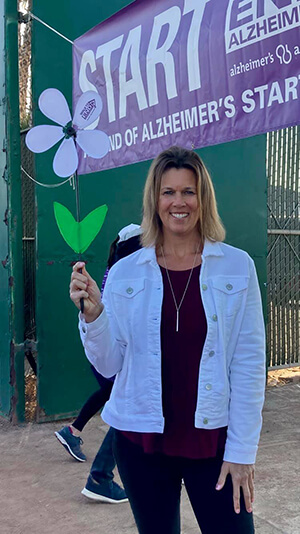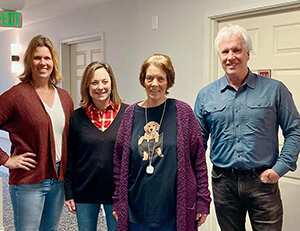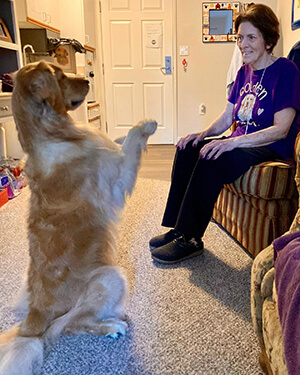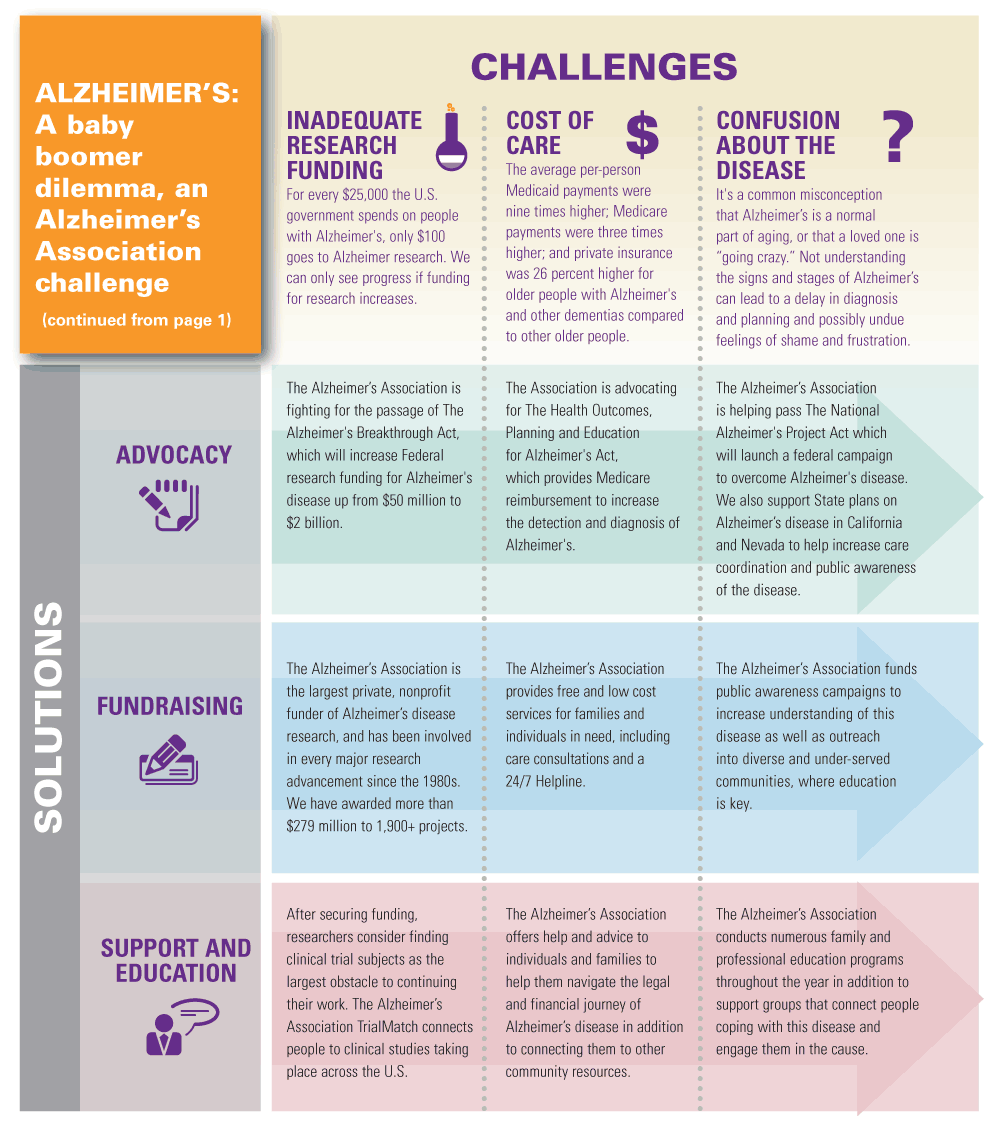Voicing hope: Radio personality lends her talents to the fight against Alzheimer’s
By Kristine Kenefick, MSN, RN
Carolyn, a Bay Area native and local radio personality, has a deep-rooted connection to the Alzheimer’s Association®. On and off for the past decade, she has proudly served as emcee for the Alzheimer’s Association Walk to End Alzheimer’s®, dedicating her time and passion to this important cause. By sharing her personal journey as the primary caregiver for her mother, who is living with dementia, Carolyn has forged meaningful connections with others facing similar challenges.
A serendipitous connection
Several years ago, Carolyn, a radio personality, was appearing at the Walk to End Alzheimer’s in San Francisco with her radio station. A staff member for the Alzheimer’s Association approached the radio station booth and asked if anyone could help out at the last minute. Their emcee was delayed, and they needed someone to fill in. Carolyn, whose grandmother had died from Alzheimer’s, didn’t hesitate to jump in.
While up on the stage, Carolyn felt connected to the audience through sharing her own experience of having a loved one with dementia. Both the audience and the staff loved Carolyn, and she was asked to return again as emcee.
Over the past 10 years, she has returned many times to emcee all three Bay Area Walk to End Alzheimer’s events (East Bay, San Francisco and Silicon Valley). “If I can make the caregivers feel a little bit more comfortable just sharing my story, then that’s what I can give back,” said Carolyn.
It’s a labor of love that is close to her heart. “This is the one event where I don’t have to prepare anything…I’m living this life every day, 24/7,” said Carolyn. While Carolyn does have three brothers who help out as much as they can, as the oldest sibling, Carolyn became the main caregiver for their mother, Mary, who is now living with dementia.
Noticing changes in mom
When Carolyn first started volunteering for Walk, Mary was not yet showing any early signs of Alzheimer’s or other dementia. But a few years ago, Carolyn started noticing some changes in Mary. “She was having trouble with her words, but honestly, I do [the same thing] now and I think a lot of people would say that,” said Carolyn.
New problems with words in speaking or writing can be one of the early signs. “My mom is 80 years old now. She was diagnosed in her mid 70s. My grandmother passed at 80 and so as [my mom] got older, I definitely suspected that this could be a thing,” said Carolyn.
Before her diagnosis, Mary was living independently in the Bay Area. She had always been very self-sufficient. She was a dog trainer and had often traveled to participate in dog shows, making the long drives on her own.
At the earliest stages, a person living with Alzheimer’s disease or dementia may begin to have difficulty with complex tasks such as driving. One day Mary called Carolyn from Sacramento after she became lost there and couldn’t find her way home.
Another time, she became lost while driving in her town. Carolyn remembers, “It wasn’t like her because my mom would do long road trips…to see my aunt in Illinois. So, for her to get lost in Sacramento or even locally…was not like her at all.”
Diagnosis
Carolyn went with Mary to see a doctor who specializes in dementia. “I thought it would be early-stage dementia or natural aging,” said Carolyn. “We had done a cat scan not too long before that, and the results had come back as just standard age-related degeneration.”
The doctor diagnosed Mary with moderate dementia. “I will never ever forget the moment when the doctor came out to me and said ‘your life is about to change forever,’” said Carolyn. “It was 100% a life changing moment.”
Navigating big decisions
The middle stages of Alzheimer’s or other dementia are typically the longest and can last for many years. For a few years after her diagnosis, Mary was still able to live independently, with a lot of help from Carolyn who lived nearby. When Mary’s symptoms started to worsen, Carolyn was faced with making a difficult decision on her mom’s behalf. She had to decide what the next stage of Mary’s care would be.
Carolyn decided that the best situation for Mary was to move into a care setting nearby where she could have around-the-clock care and her family could visit every day. Carolyn was researching different facilities when her mom became sick with an infection and was admitted to the hospital.
Mary was able to move into the care setting directly after leaving the hospital, without going home in between. Carolyn shares that this was a blessing for Mary, who has been comfortable since moving there. “From the moment that she moved in, I knew it was the right decision,” said Carolyn.
It can be challenging for caregivers to determine the best care option for their loved one who is living with dementia. “It’s never an easy situation…everybody’s situation is different, so there is no right or wrong,” said Carolyn. “There’s no class growing up [about this] when we are in school…so, many of us are figuring it out along the way with this very precious commodity, that being our parents or our loved ones… you care so much and you want them to be as happy [and as] comfortable as possible.”
A changing relationship
It is expected that the relationship with a loved one will change when they are living with dementia. Carolyn shares that this change started for her the day Mary received her diagnosis. “Your relationship with your parent changes because you now realize this is serious and [you] need to watch out for them,” said Carolyn. “That was the moment when the child becomes the parent.”
While big changes like role reversals between parents and their children can be common, not everything has changed between the mother and daughter. Carolyn still sees Mary’s personality coming through. She especially notices this when she brings her dog to visit her mom, and her mom gives her training pointers, like how to hold the leash. “[When] I bring the dog over it’s like its 1983,” said Carolyn.
Carolyn meets the changes in Mary and their relationship with understanding. Sometimes Mary will call Carolyn “Mom.” Carolyn said, “in her brain she’s thinking, this is the person who is taking care of me.”
Taking on a big role
Carolyn is her mother’s only daughter. It is often the case that women, and in particular daughters, take on the role of primary caregiver for a loved one with Alzheimer’s or other dementia. According to the Alzheimer’s Association 2024 Alzheimer’s Disease Facts and Figures report, approximately two-thirds of dementia caregivers are women, and over one-third of dementia caregivers in the United States are daughters caring for a parent.
While Carolyn is grateful to be able to care for her mom, she acknowledges that it’s important to have help. She encourages those with a loved one facing a new Alzheimer’s diagnosis to accept help and not try to do it all yourself. “Get your family together, if you have a relationship with them, and formulate a plan that is equally divided,” said Carolyn. “Don’t take it all on. You can’t imagine how much work it is until you’ve isolated yourself and you’re in it by yourself.”
In the early days of caring for Mary, Carolyn sought help through a support group. The Alzheimer’s Association Northern California and Northern Nevada Chapter offers nearly 100 support groups both online and in person. It can be overwhelming to take care of a loved one with Alzheimer’s or other dementia, but help is available. In addition to support groups, the Alzheimer’s Association has many other resources to support caregivers.
Continuing the important work
The Walk to End Alzheimer’s is held annually in more than 600 communities nationwide. It is the world’s largest event to raise awareness and funds for Alzheimer’s care, support and research. Carolyn participates in her local Walk, Walk to End Alzheimer’s – East Bay, which is happening on October 26, 2024.
“I just love the walk because…we all spend so many hours of the day fighting this fight in our different ways,” said Carolyn. “Whether you’re a caregiver or somebody with Alzheimer’s or dementia, it gives us that morning to get together to say ‘I got you.’ I love knowing that everybody there knows what you’re going through.”
For Carolyn, being a part of Walk to End Alzheimer’s is a vital way to help continue the fight against Alzheimer’s disease. She urges others to consider participating in Walk or other volunteer opportunities. “You hear on the news that advances are being made, but we need to keep going,” said Carolyn. “[We can’t] take our foot off the gas, [because] we’re actually making progress, so let’s keep going.”
You can walk as an individual or start your own team for Walk to End Alzheimer’s – East Bay on October 26, 2024.
For more information on caregiver resources visit alz.org/caregiving or call our 24/7 Helpline at 800.272.3900. The Helpline is a free service offering support for people living with dementia, caregivers, families and the public. Connect with a live person who can provide information, local resources, crisis assistance and emotional support.




















